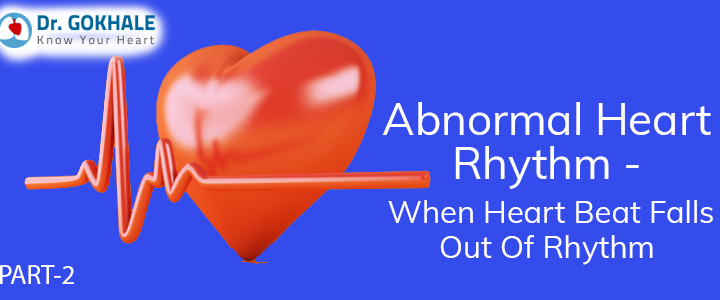Abnormal Heart Rhythm also called Arrhythmia is a condition where a human heart falls out its natural rhythm. This happens when electrical impulses that trigger the heartbeat falls out of order causing the heart to beat too fast or too slow in an uncoordinated manner interfering with the heart’s ability to pump blood efficiently.
While the causes and various types of abnormal heart rhythm are already discussed in our Part-1 here, this article focuses on the signs & symptoms and, treatments for abnormal heart rhythm condition, and tips to reduce the incidence of abnormal heart rhythms. So, here we go:
Signs and Symptoms of Abnormal Heart Rhythm:
Arrhythmia or Abnormal Herat Rhythm can be a silent condition without causing any symptoms in the first place. In a few cases, they are identified by the Doctors during a routine pulse check followed by diagnostic tests. The incidence of the symptoms can change from patient to patient, symptoms may not show up in some cases and in cases where they do, the patient may not be able to notice the change.
And the most common symptoms of abnormal heart rhythm include a racing heartbeat, shortness of breath, fainting or feeling dizzy, irregular pulse, palpitations of heart, reduced capacity for exercise. In addition to the above, anxiety, fatigue, chest pain, light-headedness are reported by the patients who are diagnosed by Arrhythmia (Abnormal heartbeat). However, two points must be noted here:
- Almost all the heart problems more or less result in similar signs and symptoms
- The seriousness of the patient’s Arrhythmia may not be tightly linked with the severity of these signs and symptoms. A severe form of Arrhythmia sometimes may show no symptoms and simple cases may manifest with severe symptoms, making it a complex situation to treat.
Treatment for Abnormal Heart Rhythm:
Arrhythmia of patients can range from a serious life-threatening condition that needs to be treated by a heart specialist to an inconsequential medical condition that can be easily treated with simple lifestyle changes. So, the treatment depends on the type of Arrhythmia the patient has and its severity.
For patients with harmless Arrhythmia, simple lifestyle changes like avoiding smoking, alcohol, caffeine, and change in medications as prescribed by the heart specialist can help improve the condition.
As for the patients with severe cases, the treatment options for Arrhythmia that are usually recommended by the heart specialists include Vagal maneuvers, Electrical cardioversion, and Catheter ablation, Implantation of artificial pacemakers, and even heart surgery to correct any abnormality that is causing the abnormal heart rhythm. As the condition is treated and brought under control, the patients are recommended to eat a healthy diet, avoid smoking, limit alcohol and caffeine, and follow an exercise regimen to further improve heart health.
That said, Arrhythmia is a simple condition that can have severe consequences on a patient’s overall health if not treated by heart specialist or heart surgeon as soon as possible. Patients with underlying heart conditions are even at higher risk if they happen to have Arrhythmia. Since it can be a silent condition, patients must have their check-ups routinely done and must consult a heart specialist as soon as they sense a change in their daily life.
If you are already looking to consult a heart specialist in Hyderabad, Padmashri Awardee Dr. Alla Gopala Krishna Gokhale is the best heart specialist in Telangana with an excellent record in the treatment of abnormal heart rhythm condition, you can contact him here: http://blog.drgokhale.com/contactus.html














